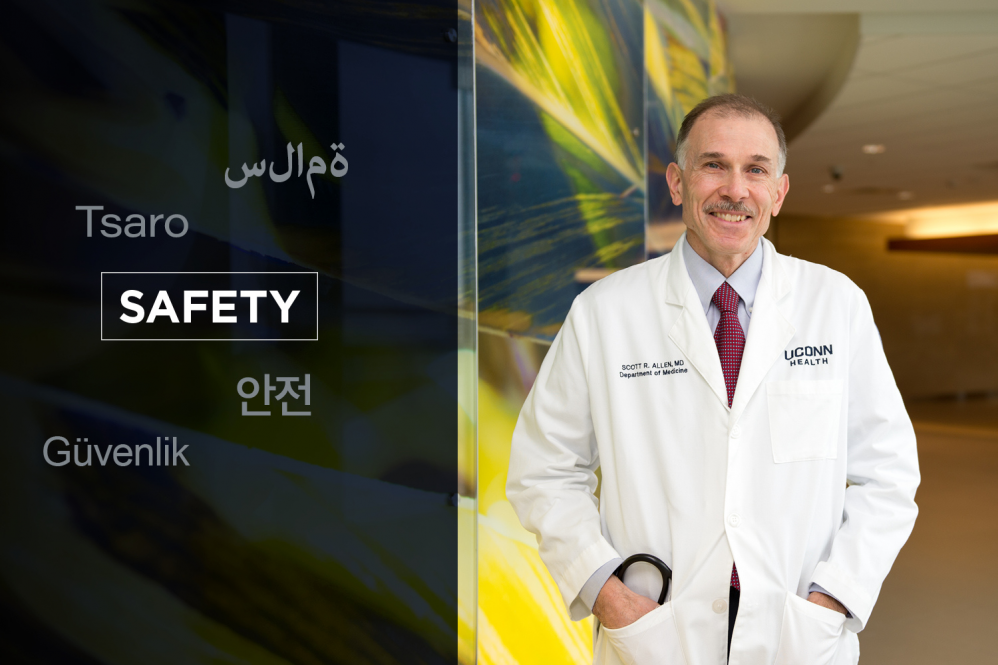Safety is the Word of the Month for April and Dr. Scott Allen, Chief Medical Officer leads that charge and shares his journey at UConn Health and what safety means to him.

It is clear by the sixth consecutive top A rating in patient safety from The Leapfrog Group, Newsweek's World Best Hospitals Award and Best in State Hospital as well as Healthgrades and the Women's Choice Awards for patient safety that the level of safety provided at UConn Health is a testament to the outstanding quality of care that we provide to the citizens of Connecticut.
Dr. Scott Allen, Chief Medical Officer leads that charge and shares his journey at UConn Health and what safety means to him.
Allen joined UConn Health in 1994 as assistant professor of medicine as a medical educator. He quickly became part of the organizational structure of the Primary Care Internal Medicine Residency (PCIMR) program. He served in several roles during his career and in 2009, he helped create the 'Quality Department' at UConn Health along with the Chief Nursing Officer (CNO) at the time, Ann Marie Capo. He assumed the roles of medical director of the Department of Clinical Effectiveness and Patient safety and patient safety officer for John Dempsey Hospital.
In 2018, he became the first Chief Quality Officer (CQO) for UConn Health. While still functioning as the CQO, he was promoted to the role of interim Chief Medical Officer (CMO) in July 2019, and was made the permanent CMO in July 2021.
Allen has established a high reliability and safety training for all staff as part of a collaborative with the Connecticut Hospital Association. He runs the morning Safety Huddle with Caryl Ryan, Chief Operating Officer for UConn John Dempsey Hospital, Chief Nursing Officer and Vice President for Quality, and Patient Care Services, and is chair of the hospital quality committee, co-chair of the clinical policy committee, assists with regulatory readiness and policy management, and oversees safety and quality.
Safety means having a culture of safety where we put the patient first and actively prevent them from getting harmed. To Allen, this means consistently employing our CHAMP behaviors: Communicate Clearly, Handoff Effectively, pay Attention to Detail, Mentor and Coach Others, and Practice and Accept a Questioning Attitude. As a system, it also means designing processes of care that are reliable, evidence-based, and patient-centric so that the patient care team can always keep patients out of harm's way.
Achieving safe care is important to our clinical mission of providing the best quality of care to the citizens of Connecticut. As the only state-supported academic medical center in Connecticut, we can demonstrate our value and importance by becoming a leading destination for healthcare; excellence in patient safety is a critical aspect to that journey. For our educational mission, at both the undergraduate and graduate medical education levels, working in a system of care designed with safety in mind, but also one that continuously improves through analysis of safety events, helps teach our learners the principles of high reliability and quality improvement. We are training the next generation of practitioners with safety as a core principle. Lastly, as we design safer systems that may also be more effective or efficient, we share that new knowledge with other health care systems, fulfilling our academic mission to utilize and disseminate new knowledge.
Providing safe care means we are achieving the leading domain of the Institute of Medicine's six aims of quality healthcare. Safe care generally means lower cost for the patient and the health system through avoidance of preventable adverse events. Safe care also helps drive a better patient experience. This then results in improved patient experience survey results which, in turn, improves performance on pay-for-performance programs as well as external scorecards such as the Leapfrog Hospital Safety Grade. Achieving a consistent Leapfrog "A", a Newsweek World Best Hospital designation, or a Healthgrades top 10% Patient Experience award helps drive market share: people are coming to UConn because they can see that we are a safe and high-quality health system.
"Every day brings new challenges. I am inspired by a former mentor who taught me the meaning of a safety system. As a physician, it is both critical and satisfying to be able to provide individualized care; but, having the opportunity to improve the quality and safety of an entire system means that I can have a positive impact on many more people," says Allen.
UConn Health embodies safety when staff take a STAR moment – Stop-Think-Act-Review - a few second, mini-mental timeout before proceeding with a specific task, to be sure you are doing the right thing. During the morning Safety Huddle 80 or more people are listening and focusing on safety in the hospital. As part of our error analysis program, our quality team has visited over 30 different clinical areas to debrief with the frontline staff and take the opportunity to brainstorm on ways to improve our system of care. The engagement of our staff in this process has demonstrated how committed our organization is to the safe delivery of care.
"UConn provides great, award-winning care because we have great people who work here. The commitment to safety and patient-centric care by all and being a part of that team is why I love what I do," says Allen.






